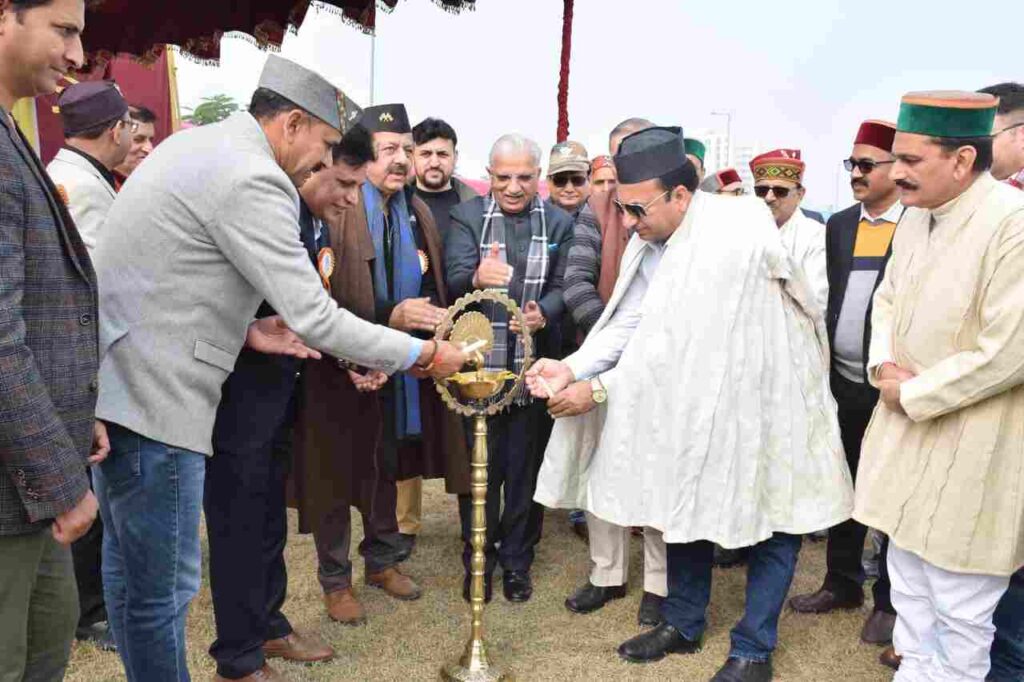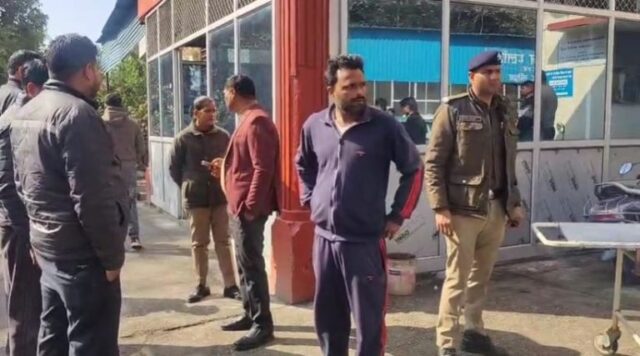Uttarakhand: Your culture, your identity, Jaunsar Bawar employee meeting ceremony organized in Delhi

Jaunsar Bawar Tribal Welfare Committee, Delhi organized a grand annual meeting and cultural programs on the auspicious occasion of Paush festival and New Year 2024 on 7th January in the huge courtyard of NDRF located in Ghaziabad, Kamala Nehru Nagar, Sector 19. Hundreds of Jaunsari enlightened people in the presence of Chairman Ratan Singh Rawat (IRS), Chairman Vidyadutt Joshi (Food Analyst Delhi Government), Chairman Bhavan Committee Rajendra Singh Tomar (Member National Disaster Management, Government of India), former Committee Chairman Kulanand Joshi (IAS) etc. It was organized in the presence of people and special guests.
The Paush festival was inaugurated by lighting lotus lamps along with other special guests and offering flowers on the portraits of prominent martyrs of the region, Kedar Singh Chauhan, Kaliram Bisht, Nantram Negi, Punak Das and Kesari Chand.
On this occasion of the annual meeting, the special guests of the committee officials included Gambhir Singh Chauhan (DIG ITBP), Praveen Kumar Tiwari (Commandant), TR Sharma Joint Director General (North-Eastern Region), CM Papanai, Kalam Singh Chauhan, Bharat Chauhan, Naresh. Along with Namdev, Sushila Rawat, Khushal Singh Bisht, Harish Semwal, PC Nailwal, Gopal Upreti, Dr Rajkumari Chauhan, Tara Papanai, Keshar Singh Rahi, he was also associated with the organizing committee and among the enlightened people who retired in the year 2023, Kulanand Joshi ( IAS), Ratan Singh Rawat (IRS), Pratap Singh Chauhan, Jaipal Rana, Ranveer Singh Chauhan, Atar Singh Tomar, Karam Chand Sharma, Ram Singh Tomar, Pawan Singh, Surendra Singh Chauhan etc. etc. by covering them with shawls on the occasion of Paush festival. And was honored by giving a bouquet. Along with the Directory 2024 published by Kar Kamalon Samiti of stage-seen and respected enlightened people, the book ‘Harun’ written by Keshar Singh Rahi on the mythological heroic stories of Himachal and Kumaon, Garhwal and Jaunsar region was released.
On the auspicious occasion of Paush festival and New Year 2024, Jaunsar Bawar Tribal Welfare Committee Chairman Vidyadutt Joshi, Building Committee Chairman Rajendra Singh Tomar, Committee Chairman Ratan Singh Rawat were present in large numbers along with Jaunsar Committee members residing in Delhi NCR, Jaunsar Bawar and The committee members who arrived for the event from different cities and metros of the country were welcomed and congratulated for the Paush festival and New Year, wishes for the blessings of Mahasu Dev were expressed, the objectives for which the committee was established at India Gate in 1998 were fulfilled. With the continuous support of all the committed enlightened members living in Jaunsar Bawar in Delhi NCR, the committee is moving towards the expected success of its objectives. It was informed that almost all the Jaunsari families residing in Delhi NCR have always been together in cultural, social and other activities in happiness and sorrow. Working together. Due to which the activities of the committee have been continuously strengthened. The committee is continuously moving towards achieving success in achieving its objectives.
It was informed by the committee officials that the money being collected for the construction of the building on the land purchased by the committee in Ghaziabad is getting satisfactory support from the people. The construction cost is estimated to be around Rs 2 to 2.5 crores. To collect the said money, the committee members have called for financial help from all the migrant brothers and businessmen of the area, contacts are being made.
As informed by the committee officials, the decision to permanently serve four traditional dishes of Jaunsar Bawar in the food plate for the first time in Uttarakhand Sadan Chanakyapuri has been taken by Chief Minister Pushkar Singh Dhami. The dishes which are now being served at Uttarakhand Sadan every Sunday. The decision taken by the Chief Minister was expressed with joy by the people of Jaunsar Bawar community present by clapping and gratitude was expressed towards the Chief Minister and his concerned department officials.
The committee officials were also informed about the work done in the field of social, cultural and public health in the past years and the success achieved.
The felicitation ceremony of Paush festival organized by the committee was effectively stage conducted by Sultan Singh Chauhan and Rajeshwar Singh and other cultural programs were stage conducted effectively by Chaman Singh Rawat.
On this occasion of the event, cultural programs were started by the women and men of Jaunsar Bawar in traditional attire along with special guests, ‘Harul’ group folk dance and singing. Paush festival was celebrated by dancing and singing in a circle in different groups in the traditional form. Ramesh Chand’s band, which participated in the event from Chakrata, made the organized festival memorable by encouraging the men and women performing ‘Harul dance’ to the tune of traditional folk dance and songs. The band of the Armed Forces also enthralled the gathering by playing national and regional musical tunes under the leadership of Band Master Pandey ji.
In the festivals of Jaunsar, child artistes not only entertained hundreds of listeners through songs and dances presented in Jaunsari dialect as well as impressive self-composed compositions, but also made the annual meeting of the Paush festival organized by the committee memorable.
Committee officers Atar Singh Rawat, Matwar S Chauhan, Kunwar Singh Tomar, Sachin Chauhan, Mangal Singh Chauhan, Arun Singh Chauhan etc. along with the team of Gambhir Singh Chauhan (DIG ITBP) played an influential role in making the function a success. Went.
It can be expressed through observation that the special identity of Jaunsar Bawar is the tradition of folk culture being passed on from generation to generation along with the continuing tradition of hospitality and high mutual feeling among the people of the region. There are many such characteristics visible in the Jaunsari community, which is selflessly dedicated to each other, which, even in the times of disintegration on the global stage, is working as a united force to give a message of inspiration to the world. Is.
It is seen that lakhs of dialects and languages prevalent on the global stage have either died out along with their culture or are on the verge of extinction, but the social and cultural existence of Jaunsar Bawar along with its dialect and language is still continuing in its traditional form. Yes, it has been cultivated from generation to generation. Not only in the villages of Jaunsar Bawar, but also wherever the people of Jaunsar have migrated, their traditional folk culture and roots of society are deeply ingrained among themselves.
The festive society of Jaunsar Bawar holds a special place in itself due to its simple cultural, social and economic beliefs. Dance music is an integral part of Jaunsari culture. During festivals, women wear ghagra, kurti, jhaga, mekdi and dhaantu along with traditional jewelery like gold bangles in their hands, bullak or nath in the nose, konthi, silver thread around the neck, tungal in the ears, dosru and maang tikka on the head. And the men are seen wearing woolen Jangol (pajama), Jhaaga (kurta), Diguwan cap along with long wide clothes, engrossed in the tune of folk music and performing folk dances like Varda, Naati, Harul and Raso.
The social and cultural fabric of this tribal area revolves around the deities worshiped by the residents and their servants. Which is clearly visible after seeing the cultural event organized.
Cultural characteristics and traditions are prevalent among the Jaunsari people migrating to Delhi NCR, which is the special identity of the people of this society. The folk culture of Jaunsar is completely different from that of Kumaon and Garhwal. This community celebrates its festivals and events
Celebrates festively. On all festivals, whether men or women, they are seen in their traditional attire. They perform folk dances like Barda, Nati and Harul in their traditional costumes at all functions. Jhaita, Raso are also included in the folk dances of Jaunsari women.
Famous not only in the country but also in the world for its unique folk culture and traditions, the traditions and customs of this region are also unique. For which this area is especially known even in this modern era. The mythological folk culture and clothing persists among the people here even in the changing era of modernity. Such attire of women is not seen anywhere, where the entire body is covered with clothes. Besides, it is also the specialty of the people of this society to demonstrate their unity by celebrating any event collectively.






